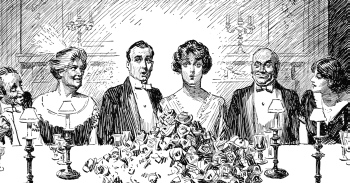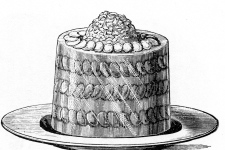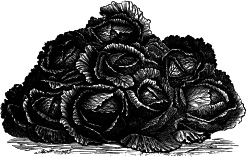An Appreciation of Agnes Jekyll
In 1921, Agnes Jekyll became the first food columnist for The Times of London. That in itself was remarkable, because women then seldom found employment with the press. During a span from the summer of 1921 until Easter 1922, she wrote 35 columns on an intriguing range of subjects. These columns were collected as Kitchen Essays and published later in 1922. Meatless meals, wedding breakfasts, tea-time and tray food attract her attention; she offers advice on “Food for Artists and Speakers” (“Musical and dramatic artists as well as public speakers and lecturers find that they cannot give out their best very soon after a substantial meal…. ”) and “Food for the Punctual and Unpunctual” (because they both “are always with us”). (Essays 162, 235)

These essays are both timebound and timeless. They are timebound in their concern over the management of a dwindling pool of domestic servants and in their predilection for aspic in (or encasing) all things; Jekyll also assumes that her reader has a working knowledge of French and considers lobster a convenience food, presumably because one’s cook keeps a store of steamed and shelled meat to hand for unexpected guests. The archaic, eccentric cast of some of these observations, and Jekyll’s penchant for the exclamation point, only add to their charm.

Her writing is timeless in its humor, compassion, wit and, almost incidentally, good recipes. Jekyll recommends variation, not least the innovative preparation of familiar ingredients, on the sensible basis that
“[w]e must put those thoroughbreds, Imagination, Generosity, Invention, into harness with our jaded hacks, Custom, Thrift and the Commonplace, as long as they drag along Time’s hurrying chariot to the often depressing sound of the family gong.
It is the old friend greeting us in the piquant disguise of a new acquaintance that interests us, the unexpected that stimulates our listless appetite, begetting thereby brilliant talk and happy memories.” (Essays 12)
So sear your lamb and simmer it with aromatics and vegetables; “add half a bottle of claret and a dash of brandy--if it can be spared--with a breakfast-cupful of good stock,” instead always of roasting it on the bone. Take English fruit (currants and raspberries) and do something Swedish (‘Rod-Gro’). Rice pudding, “our kind old friend,” is “invested with novelty and charm” by adorning it with marmalade custard and giving it a sheen under the broiler. The sensibility seems modern in its holistic approach to the sharing of food:
“In some such ways as these--and there are many, many more--can affection won be kept alive and tender, and have we not the highest authority for knowing that without love we are nothing.” (Essays 18)
There is, too, an eerie timeliness to Jekyll’s recognition of the anxiety and dislocation that marked the outset of the interwar era in Britain. Her concern for cadres of gentlewomen without marriage prospects following the carnage in the trenches sounds prescient across all strata of recession America. Here too “many who have come down in the world” also “are daily learning to solve startling problems” by “practicing the art of making drudgery divine,” but as underemployed temps or fast-food workers rather than as the domestics or farmhands of Jekyll’s time. (Essays 131-32)

She reminds us of the need “to forget for a while, if possible, the sordid limitations of a reduced income” (Essays 68) and offers frugal recipes to enhance the effort, including an appealing creamed cabbage that will be “welcomed by many who have hitherto looked with hostility on its homely virtue.” (Essays 137) She offers tricks too:
“All beginnings are important. If you can establish a name for having good food… friends will grow lyrical over your cold mutton, and even ask for the recipe of the Shepherd’s Pie--so potent and mysterious are the powers of suggestion!” (Essays 213-14)
Forget the caviar and serve consomme with glazed vegetables instead, for sometimes “Economy, our dread old friend, must decide!” (Essays 214) None of this is grim, and frugal can be cheerful, so “[l]et your dinner ware be gay but cheap, your table appointments bright and unexpected rather than costly.” (Essays 134)
Jekyll’s compassion was not limited to the page. She earned a DBE in 1918 for her ‘unstinting’ work as the Chair of St. John of Jerusalem in Clerkenwell to ensure the efficient distribution of hospital supplies, and also volunteered for wartime ambulance service, later chaired the overseers of the Aylesbury Borstal Institute for Girls and served on the bench as a magistrate, where her primary concern was the protection of women in difficulty. (DNB)
The Oxford Dictionary of National Biography describes her as a “philanthropist and political hostess” (her husband was an officer and civil servant) who was “typical… of her class and generation” but that obviously sells her short. According to The Times, if she had been born male she would have become “a great public servant.” (3 February ’37 Times) Jekyll’s DNB entry is short (it fails to assess her writing) and no one has written her biography. That oversight ought to be remedied.
Jekyll usually leads each of her Kitchen Essays with an aphorism or anecdote before explicating her recipes and interspersing them with suggestions and asides. If her format is formulaic, however, Jekyll never resorts to cliché, and never becomes strained or stilted. These introductions sparkle. Anyone who has volunteered for a nonprofit will smile upon reading that
“.... it is seldom, if ever
That people behave as they should;
For the Good are so harsh to the Clever
And the Clever so rude to the Good.” (Essays 61)
If you ever have been assaulted before coffee by ‘morning people’ or oversized servings at a B&B, then you must agree with Jekyll that
“[b]reakfast is the most difficult meal of the day, whether from its social or culinary aspect. Many of us feel like that man who, meeting a bore, said, ‘If you have got anything to say to me I wish you would kindly say it to somebody else.’ Our reluctant consciousness, but newly returned from a dream world, shrinks from all but the gentlest contacts. ‘Praise me not too much,’ as Odysseus said to Diomed [sic], ‘neither find fault with me at all’…."(Essays 73)
She must have been good with children (she dedicated the Essays to her daughters) and respected the old:
“Perhaps sympathy is what the young need most and thrive on best, and Mrs. Norton’s answer to the child whom she had been set to amuse, and had made friends with so successfully that it asked her: ‘Please, are you very, very young too?’ ‘Yes. Very, very young,’ she answered. ‘But then, my dear, I have been very young for a very long time.’ ” (Essays 47-48)
Jekyll is so good on so many subjects, from price gouging (‘The Pelican’ is justly named for its ‘enormous bill’) and Venetian ‘morals’ to the selfishness of physicians (“apples are proverbially so health-giving that no doctors can be expected to do anything but eat them themselves and discourage that practice in others”, Essays 84) that it is tempting to cite her at even further length. We have taken her advice, however, to eschew indecision and therefore offer only one more of her observations:
“[C]hoosing well is one of the most difficult things in a difficult world, seeing how profoundly it may affect our whole moral and physical well-being, whether applied to food, drink, companionships, or occupations, and that always our ‘Choice is brief and yet endless.’ Some people will never learn to choose, but, like the child at the birthday party, asked what it would like to have, say, ‘A little of everything, please.’ That way madness lies.” (Essays 55)
Words to live by.
We like Jekyll’s recipes. Many of them involve ideas rather than instructions, but we have been forewarned: “Detailed directions for the fundamental processes of cookery are available in so many excellent books that a knowledge of ordinary kitchen practice has been here pre-supposed.” (Essays vii)

Jekyll’s superb treatment of “a really first-rate ham” therefore runs to less than two lines. It ‘deserves special treatment in its boiling,’ “such as a bottle of Madiera and the addition of vegetables, spices and herbs.” (Essays 81) She sensibly grinds caraway for cakes and if her instructions for an excellent chicken, veal and sausage pudding are a bit sketchy for the twenty-first century, that is due entirely to our lost knowledge of traditional British technique.
We like Kitchen Essays for historiographical reasons too. It supports the revisionist argument of Arabella Boxer that at least among the upper classes, British foodways were vibrant between the wars, both in their revival of the indigenous tradition and in their cosmopolitan outreach. Jekyll was an advocate of seasonality and includes sound recipes from all over the world. There are apples baked with maple from America, a dish of Malay coconut shrimp, British pies as well as puddings, a Dutch omelet, French recipes and others masquerading under French names. Her range of recipes gives the lie to the contrapuntal claims that food in Britain was either apishly and incompetently ‘continental’ or stodgy, limited and usually canned. Persephone published a beautiful facsimile of Kitchen Essays in 2001.
Recipes for Ham in Madiera, Chicken, Mushroom and Sausage Pudding, and Cabbage appear in the practical.
Sources:
Anon. appraisal of Dame Agnes Jekyll, The Times [London] 3 February 1937
Arabella Boxer, Arabella Boxer’s Book of English Food: A Rediscovery of British Food From Before the War (London 1990)
Agnes Jekyll, Kitchen Essays (London 1922; Persephone facsimile 2001)
Cordelia Moyse, “Agnes Jekyll,” Dictionary of National Biography (Oxford 2004)

